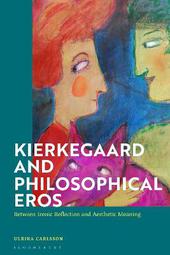
|
Kierkegaard and Philosophical Eros: Between Ironic Reflection and Aesthetic Meaning
Hardback
Main Details
Description
In a bold new argument, Ulrika Carlsson grasps hold of the figure of Eros that haunts Soren Kierkegaard's The Concept of Irony, and for the first time, uses it as key to interpret that text and his second book, Either/Or. According to Carlsson, Kierkegaard adopts Plato's idea of Eros as the fundamental force that drives humans in all their pursuits. For him, every existential stance-every way of living and relating to the outside world-is at heart a way of loving. By intensely examining Kierkegaard's erotic language, she also challenges the theory that the philosopher's first two books have little common ground and reveals that they are in fact intimately connected by the central and explicit topic of love. In this text suitable for both students and the Kierkegaard specialist, Carlsson claims that despite long-held beliefs about the disparity of his early work, his first two books both relate to love and Part I of Either/Or should be treated as the sequel to The Concept of Irony.
Author Biography
Ulrika Carlsson is Assistant Professor in the School of Philosophy at the National Research University Higher School of Economics in Moscow, Russia.
ReviewsBased on a careful and comprehensive reading of Soren Kierkegaard's The Concept of Irony, Ulrika Carlsson debunks the schematism of the so-called "theory of the stages" and clears the ground for an eye-opening reassessment of aesthetic life according to Kierkegaard. * Isak Winkel Holm, Professor of Comparative Literature, University of Copenhagen, Denmark * Equally at home in Kierkegaard's Danish texts and in the ancient Greek philosophical sources that were his primary inspiration, Ulrika Carlsson provides an insightful reading of Kierkegaard's early works that is both iconoclastic and compelling. Her book sheds light not only on this existential thinker, but also on love. * Rick Anthony Furtak, Associate Professor of Philosophy, Colorado College, USA *
|